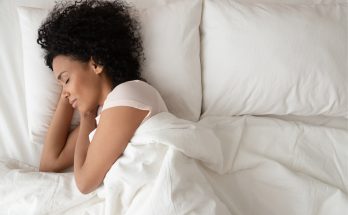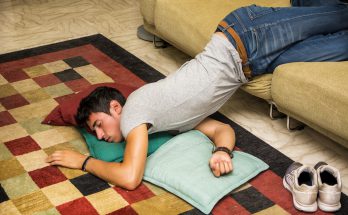I’ve never been a huge drinker because I don’t like the taste of a lot of alcohol. However, I do love a glass of wine (or two) with dinner every now and again.
In my twenties when I had a glass of wine I always felt like it made me sleep better. When I was nursing, my midwife recommended I have a half glass at night sometimes to let my milk down since breastfeeding wasn’t the easiest thing for me.
However, now I don’t drink at all because I hate what it does to my sleep pattern. While I’m able to fall asleep faster, I find that after a bit (anywhere from an hour to a few hours) I wake up and I feel restless, uncomfortable, and it’s hard to fall asleep. If I do doze off again I toss and turn and I’m not able to fall back into that delicious slumber I need.
Then, the following day I feel incredibly hungover, emotional, bloated, and irritated. All from one glass of wine. It’s just not worth it for me and for a few years, I thought I was the only one who couldn’t sleep well after having a drink or two.
It’s a common problem
After talking to a few of my girlfriends, they said the same thing: Their sleep is deeply impacted even if they only have one drink.
This isn’t a coincidence either. If you feel like your sleep isn’t at its best after having a drink, there is a reason. I talked with Dr. Tracey Evans, neuroscientist and advanced sleep practitioner who explained why alcohol isn’t the best thing when it comes to getting a good night’s rest.
Why it happens
First. Evans says alcohol does make you sleepy as it’s classed as a somnogen. “A somnogen is a substance that is sleep-inducing, so in the first instance yes, it will send you to sleep. This is why so many people will turn to alcohol at night time, because the latency to sleep can be shorter for those that struggle to drop off.”
Then what happens is that beer or margarita suppresses REM sleep (rapid eye movement) phase.
It not only delays REM sleep, but it decreases it during the first half of the night, Evans says. “In the second half of the night, it increases wakefulness,” reports Evans. This is why we often wake up and feel like we have a full-blown hangover when we’ve only had one or two glasses.
Evans says, “This change in sleep patterns can affect our cortisol and melatonin hormone levels – such that stress and further sleep disruption, respectively become a problem. The lack of ability to moderate in some to manage the stress response may further perpetuate drinking of an evening to relax and fall asleep – and so the cycle carries on.”
Dr. Leigha Saunders, a Naturopathic Doctor also weighed in on how alcohol can affect our sleep saying another reason is that alcohol raises our core body temperature. “Our core temperature needs to drop to initiate and maintain deep sleep. Having a body temp that’s higher means it’s harder for you to get good quality sleep after a few drinks,” says Saunders.
Alcohol also makes you go to the bathroom more frequently. Saunders says, Alcohol is a diuretic, meaning it encourages you to lose water and increases urination. After a few drinks, you’re likely to wake up needing to pee at night, leaving you further dehydrated.”
So, if you have noticed that unwinding with a few drinks at night is changing your sleep patterns and doing more harm than good, there really is a reason.
It’s not the best thing to do when we are trying to get a good night’s rest. And while it doesn’t happen to everyone, it might be something you want to experiment and try to give up if it is making you feel restless at night, then groggy and irritable the next day.



